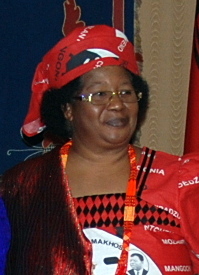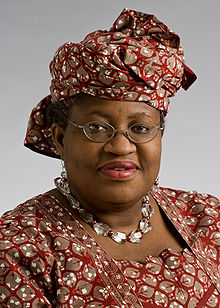For their giant strides and sterling contributions to their societies through political engagements, the formulation of economic policies and condemnation of corruption and other obstacles to development, two Nigerians have made the list of 100 top Global Thinkers for 2012.
The two Nigerians are the Finance Minister and the Coordinating Minister for the Economy, Dr. Ngozi Okonjo-Iweala and the renowned author of Things Fall Apart Prof. Chinua Achebe. Another African on the list is Malawian President Joyce Banda.
The list was drawn up by Foreign Policy, a bimonthly American magazine founded in 1970 by Samuel P. Huntington and Warren Demian Manshel.
According to Wikipedia, the magazine under Editor-in-Chief Moisés Naím (1996–2010), changed from an academic quarterly in the 1990s to a bimonthly glossy, winning the 2009, 2007, and 2003 National Magazine Award for General Excellence. The topics it covers include global politics, economics, integration and ideas.
On September 29, 2008, The Washington Post Company announced that they had purchased Foreign Policy from the Carnegie Endowment for International Peace.
Foreign Policy publishes the annual “Globalization Index,” and “Failed State Index.” Its report “Inside the Ivory Tower” provides an annual comprehensive ranking of professional schools in international relations.
Banda, the Malawian President, occupies the 22nd position on the list. According to Foreign Policy, Banda made the list for “for stepping in – and up – to fix a broken country.”
When Malawian President Bingu wa Mutharika died of a heart attack in April, it wasn’t immediately clear what would become of his vice president, Joyce Banda who had fallen out of favour with the increasingly autocratic president who sacked her from his political party in 2010.
Even Mutharika’s wife publicly derided Banda – a longtime grassroots advocate for women, children, and the poor- scoffing: “She will never be president. How can a fruit seller be president?”
After two days of tension in the wake of Mutharika’s death, however, Banda proved the first lady wrong, becoming Africa’s second-ever female president.
Governing Malawi, where an estimated 75 percent of its more than 15 million residents live on N160 or less a day, presents enormous challenges.
But in just seven months, Banda has largely shown the world how to take charge and work to turn around a troubled country.
Within days of taking office, she dismissed key members of Mutharika’s administration, including the police chief in power when 19 Malawian demonstrators were killed at a 2011 opposition rally.
By devaluing the Malawian currency by more than a third, Banda also secured a much-needed $157 million International Monetary Fund (IMF) loan in June a first step toward rebuilding Malawi’s debilitated economy.
So far, all signs suggest Banda could become a new model for African leadership, shedding the strongman syndrome and getting down to business to help the poor. She has cut her own salary by 30 percent and put the late Mutharika’s $12 million presidential jet and most of his fleet of 60 luxury cars up for sale. “I can as well use private airlines,” she said. “I am already used to hitchhiking.
“I must demonstrate to Malawians that we are in this together,
“I must be the first person to set an example.”
For Okonjo-Iweala who is 51st on the list, she was chosen “for showing Africa how to break the resource curse.”
As a candidate in this year’s unusually public race for the World Bank presidency, Ngozi Okonjo-Iweala seemingly had it all: an MIT education, high-level experience with both the bank and the Nigerian government, the potential to be the first woman and first person of colour to run the institution, and the support of everyone from the African Union to the Financial Times. She just didn’t have the one thing that really mattered: a United States passport.
But though she may have missed out on her chance to run the bank, Okonjo-Iweala is arguably as influential in her role as the powerful finance minister of Africa’s most populous country and one of its fastest-growing economies.
In a previous stint in the position, she successfully negotiated to wipe out millions of dollars of international debt, and since reassuming the post last year she has cut spending and helped establish a sovereign wealth fund to manage Nigeria’s oil riches.
Her driving idea: African countries can’t hope to develop economically until they get their institutions in order.
Although she enjoys a potent mandate from President Goodluck Jonathan, Okonjo-Iweala has seen her reform efforts consistently meet opposition from the ‘godfathers’ – the powerful officials who benefit from the oil wealth in Nigeria’s notoriously corrupt political system. Her efforts to end a popular but economically disastrous fuel subsidy have also so far been slow going. “It has not been easy, and the struggle is still ongoing,” she told Reuters this year.
“You make progress; then you get courage to make more.”
If she can succeed in helping one of Africa’s most pivotal countries overcome the infamous oil curse, it might have a much more lasting impact than anything she could have accomplished back in Washington.
Achebe who is the 68th top global thinker on the list was selected “ for forcing Africa to confront its demons.”
A giant of contemporary African letters for more than half a century, Achebe is still best known for his 1958 novel, Things Fall Apart, which drew on oral traditions to tell the story of a Nigerian village transformed by colonialism and Western-imposed Christianity.
He also became renowned for his withering critiques of depictions of Africa by European writers, demanding a literature that traveled well beyond the Heart of Darkness clichés to reveal African realities, while urging Africans to be the ones to tell their own stories.
True to that appeal, this year brought Achebe’s own powerful memoir, There Was a Country, an account of his life during the 1967-1970 Biafran war. Achebe had taken the Biafran side in the conflict, which left more than one million people dead, and served as a roving international ambassador for the breakaway government, narrowly escaping Nigerian attacks on multiple occasions. His book makes the case that the Biafran war – Africa’s first civil war to generate major international media attention – was a harbinger of African conflicts to come, from Rwanda to Congo to Sierra Leone, all of which have their roots in the arbitrary drawing of borderlines during colonialism, were exacerbated by natural resources, and proved the inability of the international community to stop the bloodshed.
“Nigeria was once a land of great hope and progress, a nation with immense resources at its disposal,” writes Achebe, today a professor of Africana studies at Brown University.
“But the Biafran war changed the course of Nigeria. In my view it was a cataclysmic experience that changed the history of Africa.” [Guardian]








Where is Mr Odia Ofeimun? The man suffering from Igbophobia? The man who hates Achebe. The man going all over the place trying to distort history, trying to tell big lies that Achebe is a liar whereas it is Odia who is the true liar. The man who said Igbos committed genocide against Yorubas and mid-westerners, the man who said the trouble with Nigeria is not leadership, the man who said Achebe is embarrassing him, the Igbo hater. I hope you and your fellow liars should cover your faces in shame. The more you try to pull Achebe down, the more accolades he receives. Shame on you Odia!
#
Your comments as usual are parochial
Odia Ofeimun and his ilks are diseased with stupiditis Ignoramus cum chronic phobia of the Igbos…they are ratfinks.
Posso solo dire con sollievo che ho trovato qualcuno che sa realmente di cosa sta parlando! Lei sicuramente sa come portare un problema alla luce e renderlo importante. Altre persone hanno bisogno di leggere questo e capire questo lato della storia.